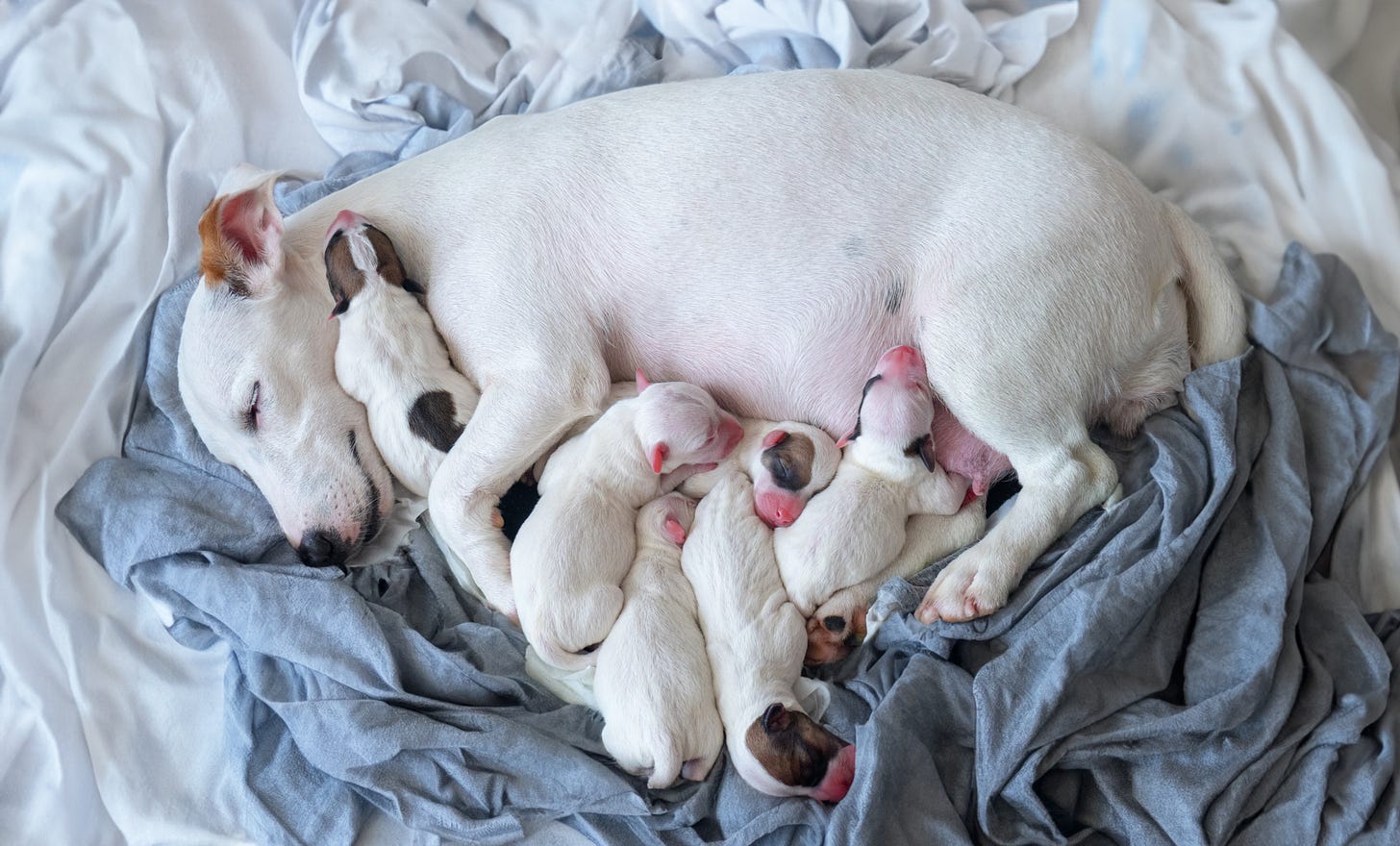If you have a dog, chances are you have visited the veterinarian’s office a few times. Scheduling regular vet appointments can ensure the healthiest life possible for your dog by staying up to date on vaccines and preventative care. From parasite prevention and treatments to birthing and breeding dogs, the professional staff at Animal Clinic Northview in North Ridgeville, Ohio, can help your pet get the best treatment possible for whatever issue you may be experiencing with your pet.
Dr. Randy Hutchison (Dr. Randy) has been a practicing vet for over 25 years at Animal Clinic Northview. When he was just 5 years old, he decided he wanted to be a vet, attend The Ohio State University, and work with his father. It helped that his Dad, Dr. Robert Hutchison, was and currently still is, a vet too. However, when Dr. Randy was 16 years old, his father sat him down at the kitchen table and told him that he didn’t have to follow in his footsteps if he didn’t want to. Dr. Randy told his Dad right then and there that his goal in life was to become a vet. Imagine how proud his Dad was that his son was going to follow in his footsteps and become the esteemed veterinarian that he is today, all because of his wisdom and knowledge that he passed on to his son.
How Animal Clinic Northview was established
As with anything great, the back story on how Animal Clinic Northview got started is a very captivating one to tell. Dr. Robert met his original partner, Dr. Gary Krone, graduated from vet school and worked for a vet in Elyria. They had a vision back then to build a full service animal clinic where they could offer services other than just vaccines and well check ups. You could say the dream was to create a one stop shopping venue where whatever your pet needed, they could provide the service.
When Dr. Randy was 3 years old, his father and soon to be business partner, started looking for a plot of land to build the office of their dreams on. This was top secret, or at least it was supposed to be top secret until one of Dr. Robert’s elderly clients told him that the ladies at the beauty parlor were talking about him building a new vet office. The word got out and Dr. Robert and Dr. Krone felt they had to do the right thing and tell their boss about it before he found out by word of mouth. Unfortunately, but actually fortunately, they both were fired the next day. This propelled them to pack up their supplies and operate their business out of their trunks while their new office was being built. They rented surgical rooms from other vet clinics and made it work. By the time the building was ready to be operational, they had approximately 3,000 clients!
Fast forward to today, Animal Clinic Northview offers so many services, including 24 hour emergency service, laparoscopic surgeries, an intensive care unit, CT scans, three types of ultrasounds, and even more. The vision of the clinic today is to provide the most comprehensive care possible with compassion.
On a personal note, I discovered Animal Clinic Northview from a mutual client and their German Shepherd, Heidi. I used to help them handle Heidi on appointments due to her reactivity to other dogs that she might encounter in the waiting room. Now, she is so well behaved that they can manage on their own, but helping my clients’ dog exposed me to the clinic. So, when I got my Leonberger, Ebi, she had her first puppy appointment with Dr. Randy and has been a client ever since.
Since then, when one of my cats was in his last stage of life, I went to the vet down the street from me that I had been going to for over 20 years. I took the cat in to find out what was going on. The vet told me that I needed to confirm her diagnosis of possible lymphoma by getting an ultrasound. They did not have the equipment there. They told me to go to Animal Clinic Northview. It was confirmed that he was in his last stage of life and his organs were shutting down. He died two weeks later at home. So, it was a no brainer for me. I switched my other cat over to Animal Clinic Northview and I have been very happy ever since.
Animal Clinic Northview offers many different services
Reproductive Services
One of the first unique services the clinic started providing other than basic veterinary medicine was a reproductive department. Animal Clinic Northview has one of the largest canine frozen semen banks in the world. Breeders choose to store their stud’s (male dogs) sperm there. A stud’s sperm can be preserved for as long as the client wants and can be used for breeding dogs. The sperm is owned by the stud dog’s owner. There is a separate agreement outside of the clinic. When the breeder finds a female to breed with their stud’s sperm, they contact Animal Clinic Northview to release the sperm. It has happened where the stud has been dead for 25 years and still producing litters!
Another reproductive service the clinic offers is a birthing unit. There are certain breeds, like the bully breeds, in particular French Bulldogs, who require C-sections when giving birth. They just aren’t big enough to handle the birthing process. However, just like there are different reasons that humans require C-sections, dogs share the same reasons. For example, the labor has failed, the mother’s life is at stake, or the puppies lives are in jeopardy. There is an observation room for the owners to watch the birthing process if they desire. It can be very exciting to watch, especially when they are all healthy and the mom is doing well. Some owners are involved and some stay in the corner, but it's very exciting to witness a live birth.
Intensive Care Unit
Animal Clinic Northview also has an ICU for very similar reasons that require a human patient to be admitted to the ICU. It is staffed by 3 to 6 nurses around the clock. It can house potentially 40 to 50 patients. Attached to the ICU is an isolation ward with a see through window. It is separate from the normal wards where patients go so as to not cross contaminate with healthy pets. For example, if a pet has a respiratory illness such as Parvo, these patients will be in the isolation ward separated from the other ICU patients.
Animal Clinic Northview promotes their techs to specialize in certain departments. If a vet tech shows interest in wanting to be trained in working with specific cases, they are encouraged to do so. So, the vet techs who tend to patients in the ICU are dedicated to this department. You won’t see an ICU nurse in your well check up visit. These techs are experts at handling serious cases like infectious diseases, pneumonia, diabetes, and heart and kidney diseases which require constant supervision. An ICU technician may have the exact same licensing as a surgical technician or a floor technician, but they have chosen to follow a certain path that they are very passionate about. Very few clinics have this type of set up in the United States.
Exotic Pets
Not only can the vet technicians and assistants choose a certain department to specialize in, but so can the veterinarians themselves. At Animal Clinic Northview, it’s not just about cats and dogs. There are 3 doctors who cater to clients with exotic pets such as birds, small mammals, snakes, tortoises, and rabbits, just to name a few. There are also vet techs who assist these vets with surgeries on these animals and even turkey, chickens, and reptiles. They are just as loved as a pet as a dog or cat can be. The staff at the clinic recognize this and want to be able to provide services to as many different pets as possible.
Common Reasons Why Dogs Require a Vet
For the purpose of this interview with Dr. Randy, I will be discussing common dog issues that require a vet visit. It just so happens that Dr. Randy’s field of expertise is dogs. When most people think about vet visits, they think about vaccinations - preventative medicine.
Vaccinations
Whether you are bringing home a puppy or a rescue dog, it is strongly advised to keep up to date on vaccinations in order to prevent diseases. The most common series of shots is the DHPP : Distemper, Hepatitis, Parvo and Parainfluenza. When puppies come in for their first visit, frequently they have had at least one round of this all in one shot. This vaccine protects dogs from getting these potentially serious infections and helps keep them healthy for their lifetime with follow up boosters.
One common misconception about the puppy series is that they need to be vaccinated often to get the proper dosage in them in order to prevent illness. Dr. Randy clarifies this by stating that it doesn’t matter how many shots a puppy has had. What matters is that by week 16 of a puppy’s life, this is when the mother’s immunization passed on through the colostrum and milk has waned and the puppy’s own immune system kicks in. However, if the health of the mother’s immune system is not optimal, this can affect the strength of the antibodies passed on to the puppies in the colostrum within the first 48 hours. Hence, the reason why the first series is commonly given within the first 8 weeks of life. The second round typically follows around a month later, and the very last series is administered around week 16. Even if breeders insist that they have already given the puppy 3 rounds of shots prior to 16 weeks, the truth is that the maternal antibodies negate the vaccines. So, all of those vaccines that breeder gave the puppy are useless. One hopes that this doesn’t happen because a puppy’s immune system can be bombarded with vaccines to the point where even that can cause issues.
It is sometimes impossible to determine whether a dog from a shelter has had prior vaccinations. There are such things as titers, but they are not reliable. For example, a titer may show the presence of Parainfluenza, but it does not differentiate between exposure to the disease or immunization of the disease. Therefore, if there are no shot records on a rescue dog, a mini puppy series will be highly advised for adequate protection.
In addition to the core vaccine DHPP, are the rabies, bordetella, Leptospirosis, and Lyme vaccines. The rabies vaccine is typically administered between 4 and 6 months of age so as not to bombard the puppy’s immune system that has already had the DHPP vaccine. Rabies can be a very serious illness in humans and animals which can cause eventual paralysis and changes in behavior. Dr. Randy points out that each state has different guidelines for rabies and other shots. If you plan to move out of state, contact a vet immediately to make sure your pet adheres to their vaccination schedule. In Ohio, the first rabies shot is valid for one year. After the first year, boosters are required every 3 years.
Bordetella is commonly referred to as kennel cough. However, kennel cough is a generic term for what vets call infectious tracheobronchitis, which means inflammation of the upper airway. Parainfluenza is one of the main components of upper respiratory illnesses like Bordetella. So, a dog may be vaccinated for parainfluenza in the DHPP series, but it does not prevent Bordetella. There is a separate shot for that which is commonly required at doggie daycares or boarding facilities. Bordetella is highly contagious and takes sometimes up to 10 days for them to fully recover to the point where they are no longer infectious.
Leptospirosis is a bacterial infection in dogs and is spread through the urine of infected animals. It can cause symptoms ranging from fever and lethargy to kidney and liver damage. Dogs love to lap up puddles of water or even lick dewey grass. However, if your lawn is frequented by raccoons, possums or other rodents, the potential for them to ingest the bacteria that causes leptospirosis increases. The vaccine for leptospirosis is a must for all dogs, especially if you hike with your dog.
Lyme disease is spread by ticks which hang out most commonly in tall grassy areas. Ticks are so much more prevalent in Ohio now than they were even 10 years ago. Pennsylvania used to be notorious for Lyme disease but with deer and other animal migration, Ohio and parts of Michigan have seen an increase in Lyme disease as well. The heartworm tests that the clinic now does include the three most common tick diseases, which are Lyme, Ehrlichia, and Anaplasmosis. If these tests come up positive, it can just mean that your dog was exposed, but may not yet have the symptoms of the disease. However, they should be treated so that they don’t get sick from it.
In reference to all of the vaccines that are available to pets, it is important that your vet inquires about what activities you plan to do with your dog. If you plan to send your dog to a daycare or a boarding facility, they will suggest certain vaccines. If you are planning to take your dog hiking, you will want to consider the Lyme vaccine and Leptospirosis. Your vet will decide which protocol best suits your dog based on your level of activity and exposure to certain locations.
Common Parasites in Dogs
There are many flea and tick preventatives on the market today. Fleas can be a nuisance to get rid of, especially if they inhabit your house. We humans can bring in fleas and ticks on our shoelaces and socks. The best way to prevent an infestation is to give your dog either a topical or oral dosage of a flea and tick preventative. Some names of these products are Advantix, Simparica, Nex Guard Plus, Revolution and Bravecto. Talk to your vet to help you decide what is best for your dog.
One thing to remember when dealing with fleas and ticks is that fleas typically die off with the first frost of the winter season, unless they are warm and cozy in your house. Outside, they will start their whole life cycle all over again in the springtime. Ticks go dormant in the winter, but do not die. They come “back to life” on the first 70 degree days looking for a host to latch on to. Flea and tick preventatives do not prevent these parasites from hopping on to your dog. They kill them within 48 hours of when they land on the animal. It can take several weeks for the flea preventative to kill all stages of life of the flea. Therefore, monthly applications are highly advised in order to totally eradicate the infestation. It takes approximately 36 to 48 hours for a tick to transmit disease to your dog. Even if you give your dog a flea and tick preventative, it is best to remove the tick with a tick remover tool once you notice it to ensure you removed the entire body of the tick.
Giardia
Giardia is an intestinal parasite that has become more prevalent in the past 5 to 10 years. There are big influxes of cases in the spring and fall. Dogs can get it from contaminated water or soil. It can be very difficult to treat and to rid the dog of this parasite. It causes very runny diarrhea and lethargy. Whenever a human or animal has diarrhea, it is essential to stay hydrated. Giardia is a zoonotic parasite which means it can be transmitted from animals to humans through fecal contact. Whenever I find out that a client’s dog has Giardia, I take off my shoes before entering the house and disinfect them. I don’t want to possibly spread this to my pets.
Antibiotics will be prescribed to rid Giardia from their host. Sometimes the antibiotic will have to be changed because the initial one was not effective. The good news is that Dr. Randy does not hear about his clients getting Giardia from their dog, but he does recommend that they tell their doctor. Out of all the parasites, Giardia presents the most severe gastrointestinal symptoms of them all. Dogs will have bloody diarrhea, they will have bouts of vomiting and will lose their appetite.
Roundworms and hookworms are zoonotic as well. A lot of the heart worm preventatives also kill roundworms and hookworms so they aren’t as prevalent. This is why it is important to bring in a fecal sample for your annual checkup. Bottom line is if you have a dog, you should be very aware of maintaining exemplary hygiene so that you don’t contract any of these nasty parasites too.
Coccidia
Another parasite that is common is Coccidia. Your dog can get coccidia from eating bunny poop. Dogs love bunny poop! Actually, dogs love any kind of poop. Even their own! Coccidia is easier to treat and doesn’t tend to get dogs that sick, but they still need to be treated by your vet to get rid of the parasite. It tends to affect puppies worse than adult dogs. Sometimes adult dogs can get rid of it themselves if they have a robust immune system,
Coprophagia
Coprophagia is the technical term for dogs eating their own poop or the poop of their pack mates. Dr. Randy believes that this is just a nasty habit and not an indication that the dog is lacking some kind of nutrition. There can be health issues such as anemia or iron deficiency that can lead the dog to search for “food” to satisfy this condition. However, it is typically just a gross habit. As a dog trainer, I advise clients who are having this particular issue with their dog to take the dog out on a leash to eliminate. That way you can jerk them away from their poop if they go for it. It is also necessary to pick up the poop right away to take away that temptation.
All of this talk about parasites and poop has led to Dr. Randy earning the nickname of Dr, Butts and Guts. Out of all of the 34 doctors he manages on staff, Dr. Randy is always summoned when they need his expertise on an issue having to deal with a dog’s butt or guts. In my next episode with Dr. Randy, we will discuss some of the surgeries he performs and you will discover how he lives up to that nickname!

















Share this post